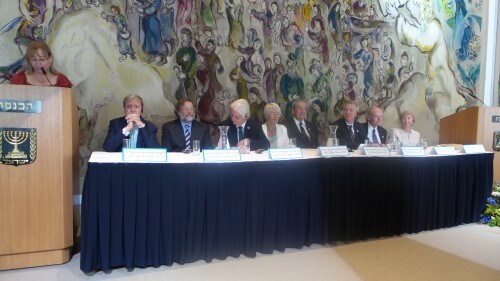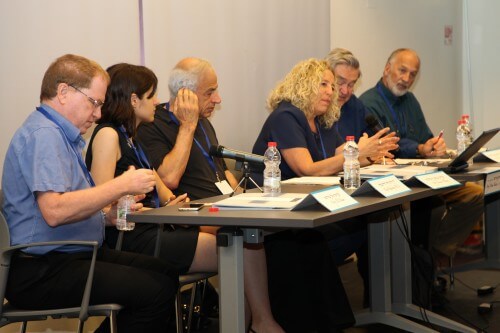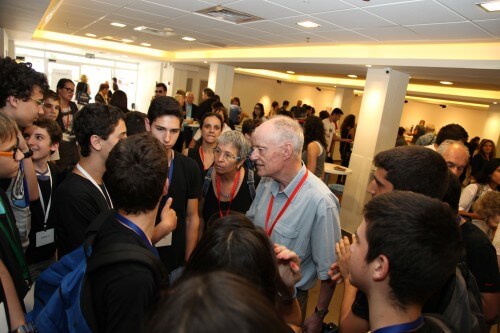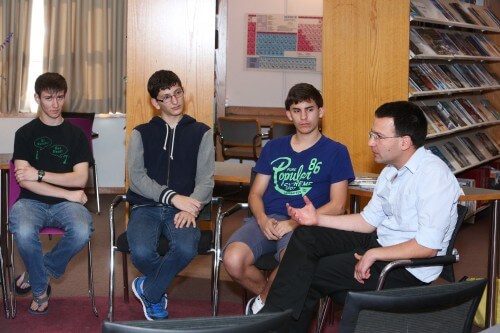Dr. Liat Ben David, CEO of the Wolf Foundation explains that science communication has three partners - the scientists, the general public and the mass media

The accessibility of science to the general public through a variety of activities depends on the mutual inclusiveness of three key factors:
- the scientists - who are required to develop the understanding that knowing their research, goals and working methods is essential to the establishment of sustainable science. This introduction is necessary for two main reasons: it encourages others to choose the scientific professions as a way of life, a choice that is essential for the continuity of science; And it strengthens the support of the general public in investing resources to promote scientific research, as a socio-national interest.
- The general public - The ability of different audiences to be exposed to science in a variety of presentation ways and places, strengthens the perception of the sciences as up-to-date and relevant areas of thought for all, required for the prosperity of both the individual and society.
- mass media - whose role is to be a fair mediator, who interprets in an accessible and clear manner to the general public the various aspects of science, including achievements, challenges, applications, resources and more.
Each of these factors is an essential cornerstone for the development of a society that seeks not only to prosper, but to be a leader among the decision-making and policy-making community of nations in the twenty-first century.
In the midst of all these, the Wolf Foundation's prize enterprise has a unique central message: this is the excellence we recognize and cherish, these are the heroes of our culture, this is what we aspire to be, as individuals and as a society. Hence, the winners of the awards and the fund itself have a valuable role that is a mission: to develop ways that make their work a role model for the next generation.
In order to achieve this goal, in recent years the Wolf Foundation has developed an annual set of activities based on the following principles:
- A humanistic view of the sciences as products of man, for man.
- Excellence is a value and a lifestyle, not just achievements.
- Making science accessible requires a multidisciplinary educational approach, which creates a significant connection between science and culture.
- Wolf Foundation winners, in their various categories, represent the best of human excellence in their field. This excellence deserves to become a beacon for the general public in general, and for the future generation of Israel's outstanding people in particular.
- The system of activities is built on five components, which feed and complement each other:
- A. Creating meaningful collaborations - with various organizations and people, who hold the accessibility of science dear to their hearts. Academic and educational institutions, programs to promote excellence, the industry, the media and public figures are some of these factors.
- B. Diversity in both the level of the audience and the type of activities - researchers, students, high school students and the general public are invited to lectures, seminars, conferences and discussions around round tables, where they discuss with the winners about their work, their lives and their decision-making methods, and the dilemmas, challenges, successes and various applications of their work; All this, while making sure to create a significant connection between the field of occupation of the winners and other fields of opinion and culture.
- third. Combining professional and personal aspects - meetings between Wolf Fund winners and students create an opportunity to get to know the scientists directly, personally and informally. The discussions at these meetings deal with two main issues: the researches thanks to which the prizes were awarded to the winners; And a personal discussion about the researcher's life - what a researcher's life looks like, how his work affects his family, unique landmarks in his life and in the case of Israeli winners, the researchers tell why they chose to build their lives and work in Israel.
- d. Multidisciplinarity - the bulk of the activities deal with current issues, the knowledge and understanding required to deal with them are based on different fields of thought - sciences, arts, history, sociology, psychology, ethics, philosophy, communication and more. Issues such as - what are the factors of success, how is it measured and what defines excellence? Is life a phenomenon unique to the earth, and what are the consequences of the various answers given to this question? What are the interrelationships between science, the scientific establishment and the general public, and what are the main factors influencing these relationships? How does the cyber age affect different aspects of everyday life, such as information availability, security, economy, human relations? and the like.
- God. Activity - Students participating in the various activities are required to prepare in advance and to participate actively, which includes research, doing and documentation of various types, such as - articles, interviews, Facebook pages, videos, blogs and more, which allow exposure to additional circles.
An example of a system of activities that was built and implemented in 2005 is the activities of the decade of the Kril Award. In 2015, the Wolf Foundation founded the Krill Prize - a prize awarded every year to outstanding young Israeli scientists, who are at the beginning of their independent scientific careers. In 2015, the Wolf Foundation and Hamdaa - the Center for Science Education in Tel Aviv, teamed up to mark a decade of the awarding of the Krill Prizes by making the winners and their research accessible to the general public in a variety of activities, including lectures open to the public by scientists who have won the Krill Prize from the beginning of its award until today . In these lectures, which dealt with the winners' research, time was set aside for questions and answers from the audience. About two hundred people participated in each lecture, from all ages and the public; Meetings between Krill Prize winners from the last decade and among high school students who excel in the sciences; and holding the XNUMX Krill Awards ceremony as a public event integrated into the Israel Science Day events, in the presence of the Director General of the Ministry of Science, families, academic representatives and the public. At the end of the ceremony, "round tables" were held between the new winners and students from honors programs from all over the country; and an evening of TED-style lectures where three of the winners lectured, with the participation of the general public. All activities were accompanied by public relations and media exposure at various levels.
The full participation in the meetings, as well as the growing demand for their existence, became a milestone in the joint activity of the Wolf Foundation and Hamada. The feedback received from both the participants and the scientists is the infrastructure for continuing this activity in the coming years as well. One of the students of Hamada concluded a "round table" meeting with one of the Krill Prize winners with the following words: "The meeting was simply inspiring! When he said that at every stage of his career he was sure that he was the stupidest in the room and here, in a moment it will be revealed for all to see... he said that he was so afraid of this moment, when his stupidity would be revealed that this fear almost paralyzed him - but that moment did not come. I feel just like him! When I saw such a successful scientist also feel it - I gained a lot of confidence in myself!"
This strategic concept, of the Wolf Foundation Prizes as a tool for making science accessible, began its journey four years ago. Every year, the number of participants in the various activity circles is increasing, as well as the variety of institutions, partners and their geographical distribution. Experience proves that pupils, students and researchers who were exposed to the activity, return to the following activities as well; make connections with winners to learn more about their works; and see these meetings as a source of motivation and inspiration.
bibliography:
1. Science communication - a question of accessibility, Ben David Liat, Scientific American Israel, April-May 2015 issue. http://www.sciam.co.il/archives/8687
2. Approaches to teaching science - Ben David Liat, Ramot Publishing, Tel Aviv University, 1998.
3. Two cultures, one human society - Ben David Liat, Hidan, May 2012
4. The missing piece - Liat Ben David's blog, articles - www.liatbd.com
5. The collaboration with Hamada was made possible thanks to the CEO, Dr. Tahla Ben Gay and the director of the culture-science program at Hamada, Dr. Eitan Crane.



(Post) - From the words of Prof. Saif, winner of the Wolf Prize in Agriculture: "We discovered, once again, the simple truth: the viruses that we study and that kill thousands of women, people and children every year, do not distinguish between rich and poor, do not consider borders, not color Skin, not religion, not race or sex. This is the reality that we are investigating and trying to find a solution for.
More of the topic in Hayadan:
- The students of the "Scientists and Inventors of the Future" project present the winners of the Wolf Prize for 2015
- Early warning before a star explodes. - Interview with Krill Award winner Dr. Eran Ofek
